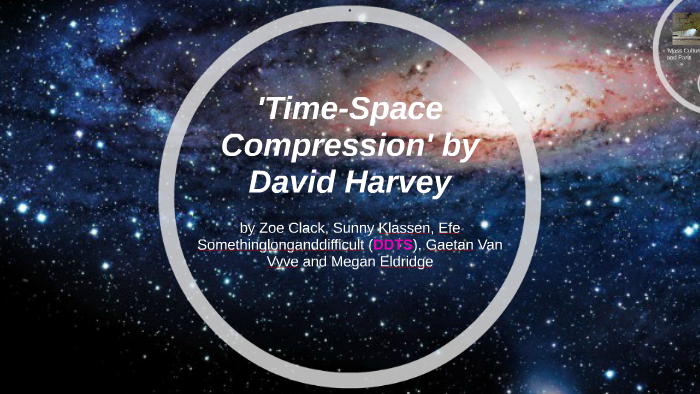



As Harvey sees it, Fordism, and the Keynesian economics it was bound up with, was too rigid as a mode of organization and accumulation.

"Fordism" refers to a process of coordinating production with consumption in order to attain a more complete assimilation of the working class to capitalism, relying on psychological management techniques. Specifically, Harvey directly relates postmodern developments to the shift from Fordism to a "more flexible mode of accumulation" (he deliberately avoids the term "post-Fordism" to avoid suggesting there are not some fundamental continuities in the two modes of capitalist organization).įordism emerged with the attempts by Henry Ford to provide workers with sufficient income and leisure time to consume the products they produce. Rather, postmodernism results from new organization and technological forms developed by capitalism in the second half of this century. Unlike Baudrillard and other radical postmodernists, Harvey does not see postmodernism as some radically new postindustrial or even postcapitalist development. The most interesting and important aspect of Harvey's book is his attempt to situate postmodernism within the logic of advanced capitalism. Yet, unlike most other Marxist readings of postmodernism, Harvey also sees positive aspects to postmodernism, such as its concern for complexity, difference, otherness, and plurality which are neglected in many modern practices. Also, he believes that the "meta-narratives that the post-modernists decry (Marx, Freud, and even later figures like Althusser) were much more open, nuanced, and sophisticated than the critics admit" (115). Harvey objects to the assimilation of a wide variety of modern architectural forms to the debacle of housing projects such as Pruitt-Igoe, and he claims modernists found ways to contain explosive and anarchic forms of capitalist development. Moreover, Harvey finds that postmodernists provide a caricatured account of modern cultural and theoretical practices. Postmodernism avoids the realities of political economy and global capitalism and precludes the possibility of a positive politics informed by normative principles. He criticizes postmodernism for being too nihilistic and for embracing aesthetics over ethics. Harvey is neither overly uncritical nor celebratory toward postmodernism. As he puts it, where a modernist like Baudelaire tried to combine in a modern aesthetic both the eternal and the transitory, the whole and the fragmentary, postmodernism rejects all attempts to represent the immutable or ordered patterns and totalities, in order to revel in flux, fragments, difference, and chaos. Postmodernism represents not a complete rupture from modernism, but a new "cultural dominant" where elements that could be found in modernism appear in postmodernism with added emphasis and intensity. At the same time, he avoids exaggerating the novelty of postmodern developments and sees both continuities and discontinuies with modern practices. Rather than rejecting postmodern developments as superficial and merely transitory, he believes they represent a new paradigm of thought and cultural practice that requires serious attention. Harvey's basic approach to postmodernism is sound. To understand postmodernism and postmodernity, one first has to understand modernism and modernity, and Harvey provides good accounts of the major sources of modern ideas and the key structural features of modernity. Working from Marxist premises, his argument is similar to Fredric Jameon's claim that postmodernism is "the cultural logic of late-capitalism," with the difference that Harvey provides considerably more empirical support for this view. Harvey relates postmodern developments to shifts in the organization of capitalism and new forms of time-space experience. Harvey's main argument is that, beginning around 1972, there has been a "sea-change" in political, economic, and cultural practices, involving the emergence of a new postmodern sensibility in numerous fields and disciplines. The Condition of Postmodernity is a significant new work by Harvey that situates postmodern theory within a broad social context. Book Review: The Condition of Postmodernity, David Harveyĭavid Harvey is well-known in social theory circles for books like Social Justice and the City (1973), The Limits to Capital (1982), The Urbanization of Capital (1985), and Consciousness and The Urban Experience (1985) - all seminal attempts to chart the relatively new and unexplored interface between political economy and urban geography.


 0 kommentar(er)
0 kommentar(er)
